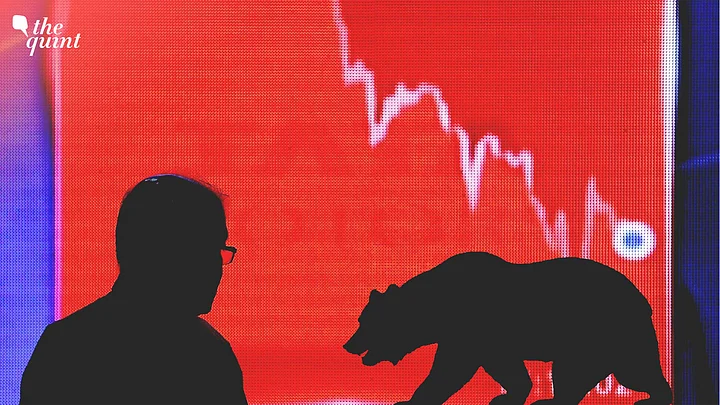Global equities had a dream run at a time when the world was coping with the COVID-19 pandemic and a global shutdown. In response, central bankers flooded the economies with colossal liquidity, sending global equities to record highs. While the global GDP shrank, stock indices were rallying.
The indices moved far ahead of the fundamentals and the reality started sinking in sometime in December 2021. Over the last five months, US equities have lost more than $7 trillion. Nifty is down by 15.7%, Nasdaq by 28% and Dow by 15%. Tech stocks have been hammered brutally – some of them have fallen 80% from their peak valuations. As Fed is expected to pursue a contractionary monetary policy, the valuations will drop further for reasons of slower economic growth and portfolio outflows. Most of the global equities are aligned with US markets as of now.
Over the last five months, US equities have lost more than $7 trillion.
Rising commodity prices sent metal stocks to dizzying heights and tech sector valuations were on a futuristic model, which totally ignored commercial and economic sensibilities.
There is a global financial war going on – trade and currency war. America may have made a strategic mistake by weaponising the dollar.
The debt-to-GDP ratio is becoming a new headache, with global debt crossing $300 trillion.
India is in a sweet spot compared to the rest of the world, but businesses will feel the impact of rising interest rates, high energy & input costs and the global slowdown in the next three to six months.
The sudden destruction of wealth over the last two months has left fund managers and the public dismayed. Unfortunately, the writing on the wall was pretty clear as at some point, the valuations, cash flows and macroeconomic factors became irrelevant. Excess liquidity over the last two years created big bubblets in equity markets, especially in the tech sector. It looks like everybody wanted the bull run to just continue, central bankers and governments included.
Tech Sector Was in Its Own Sweet World
The fall started primarily because of macroeconomic factors, liquidity-driven froth and tech bubblets. Rising commodity prices sent metal stocks to dizzying heights and tech sector valuations were on a futuristic model, which totally ignored commercial and economic sensibilities. Relentless currency printing and supply-side disruptions created by Chinese shutdowns led to a 40-year-high inflation in the US. The Russia-Ukraine war further worsened the situation by exacerbating global uncertainties.
Besides, there is a global financial war going on for real – trade and currency war. America may have made a strategic mistake by weaponising the dollar. Russia, China, Saudi Arabia and a host of other countries are working on de-dollarisation. The sanctions and supply-side disruptions have resulted in a food and energy crisis. Food inflation is impacting humanity like never before in the recent past.
Inflation Has Pushed Central Banks Into Panic Mode
The inflation flu is the new COVID variant that has infected all economies and stock markets. Central banks are now suddenly in panic mode as inflation has become numero uno bête noire. In line with global central banks, the Reserve Bank of India is expected to tighten liquidity and increase interest rates in the near term.
The debt-to-GDP ratio is becoming a new headache, with global debt crossing $300 trillion. We could be staring at an encore of the 1997 Asian Financial Crisis and the 2008 Lehman Crisis – a mélange of debt contagion and currency wars.
Going forward, many nations are in danger of staring at a sovereign default or an internal debt trap because of the worsening debt-to-GDP ratio. China and the US, the two largest economies, are also in a precarious economic situation; both have the potential to lead the world into a recession.
India, the 'Fastest-Growing' Economy, Is in a Sweet Spot
US macros are in an unprecedented mess. Years of fiscal profligacy covered up by relentless currency printing has structurally weakened the US economy. The debt-to-GDP ratio is at 125% and inflation is at a 30-year high. Markets will get into a panic mode when stagflation and recession start to set in.
All these factors are impacting stock markets as typically, they are a function of liquidity and financial performance. Interest rate hikes and liquidity tightening are likely to compress the price-earnings ratio, and, therefore, the stock markets are expected to remain bearish. Rising interest rates will cause funds to move into other asset classes. The rising debt cost and the drying up of private equity funding could severely challenge the economics, valuations and existence of some tech companies. Tech meltdown could challenge the ‘unicorn’ status of quite a few new generation companies.
India is in a sweet spot compared to the rest of the world as it is seen to be the fastest-growing economy. However, businesses will feel the impact of rising interest rates, high energy & input costs and the global slowdown in the next three to six months. Corporate earnings will be under stress in the short run. Stock markets will remain susceptible to portfolio outflows.
Foreign institutional investors (FIIs) have already sold more than $40 bn of stocks since October 2021. FIIs will again start investing in Indian markets when they become relatively attractive in comparison to global equities.
We are likely to see Nifty at lower levels of 14,350 or 13,050 sometime this year. Any ‘Black Swan’ event or systemic sovereign defaults could take the markets even lower.
(The author is Managing Partner at Alquimie Advisors. This is an opinion article and the views expressed are the author's own. The Quint neither endorses nor is responsible for them.)
